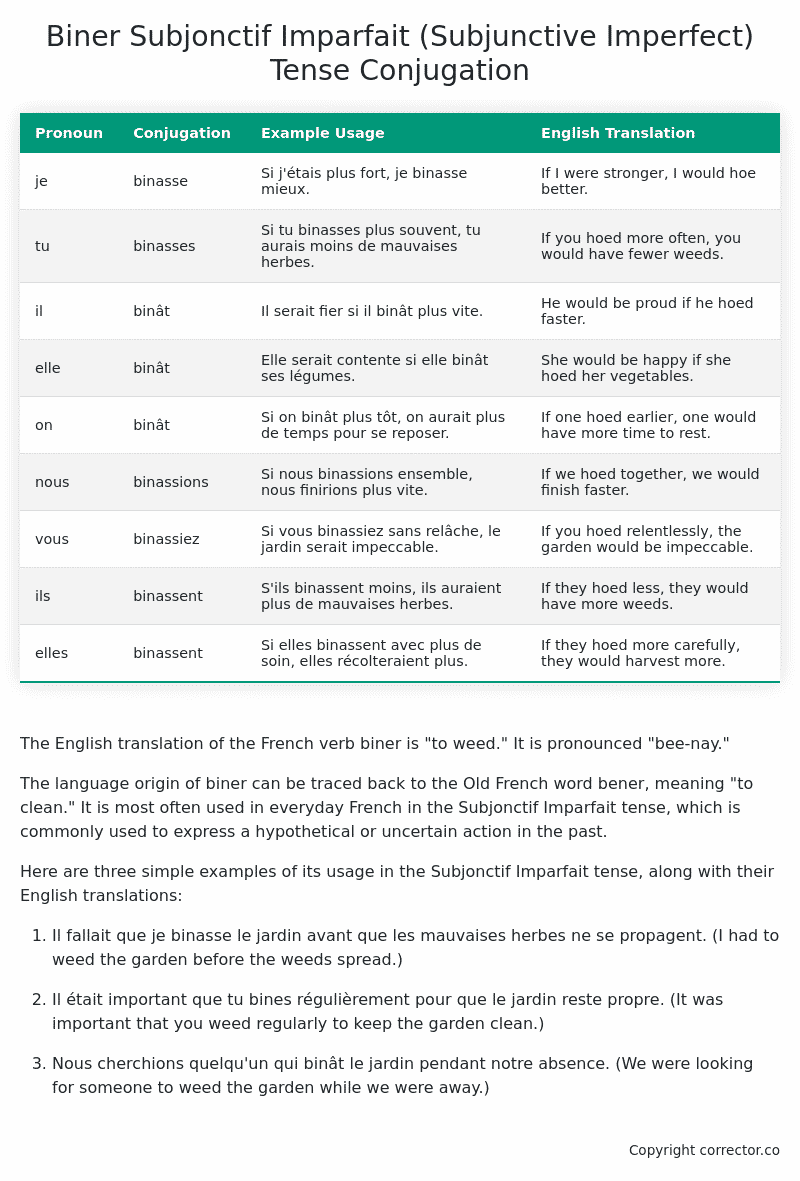Subjonctif Imparfait (Subjunctive Imperfect) Tense Conjugation of the French Verb biner
Introduction to the verb biner
The English translation of the French verb biner is “to weed.” It is pronounced “bee-nay.”
The language origin of biner can be traced back to the Old French word bener, meaning “to clean.” It is most often used in everyday French in the Subjonctif Imparfait tense, which is commonly used to express a hypothetical or uncertain action in the past.
Here are three simple examples of its usage in the Subjonctif Imparfait tense, along with their English translations:
-
Il fallait que je binasse le jardin avant que les mauvaises herbes ne se propagent. (I had to weed the garden before the weeds spread.)
-
Il était important que tu bines régulièrement pour que le jardin reste propre. (It was important that you weed regularly to keep the garden clean.)
-
Nous cherchions quelqu’un qui binât le jardin pendant notre absence. (We were looking for someone to weed the garden while we were away.)
Table of the Subjonctif Imparfait (Subjunctive Imperfect) Tense Conjugation of biner
| Pronoun | Conjugation | Example Usage | English Translation |
|---|---|---|---|
| je | binasse | Si j’étais plus fort, je binasse mieux. | If I were stronger, I would hoe better. |
| tu | binasses | Si tu binasses plus souvent, tu aurais moins de mauvaises herbes. | If you hoed more often, you would have fewer weeds. |
| il | binât | Il serait fier si il binât plus vite. | He would be proud if he hoed faster. |
| elle | binât | Elle serait contente si elle binât ses légumes. | She would be happy if she hoed her vegetables. |
| on | binât | Si on binât plus tôt, on aurait plus de temps pour se reposer. | If one hoed earlier, one would have more time to rest. |
| nous | binassions | Si nous binassions ensemble, nous finirions plus vite. | If we hoed together, we would finish faster. |
| vous | binassiez | Si vous binassiez sans relâche, le jardin serait impeccable. | If you hoed relentlessly, the garden would be impeccable. |
| ils | binassent | S’ils binassent moins, ils auraient plus de mauvaises herbes. | If they hoed less, they would have more weeds. |
| elles | binassent | Si elles binassent avec plus de soin, elles récolteraient plus. | If they hoed more carefully, they would harvest more. |
Other Conjugations for Biner.
Le Present (Present Tense) Conjugation of the French Verb biner
Imparfait (Imperfect) Tense Conjugation of the French Verb biner
Passé Simple (Simple Past) Tense Conjugation of the French Verb biner
Passé Composé (Present Perfect) Tense Conjugation of the French Verb biner
Futur Simple (Simple Future) Tense Conjugation of the French Verb biner
Futur Proche (Near Future) Tense Conjugation of the French Verb biner
Plus-que-parfait (Pluperfect) Tense Conjugation of the French Verb biner
Passé Antérieur (Past Anterior) Tense Conjugation of the French Verb biner
Futur Antérieur (Future Anterior) Tense Conjugation of the French Verb biner
Subjonctif Présent (Subjunctive Present) Tense Conjugation of the French Verb biner
Subjonctif Passé (Subjunctive Past) Tense Conjugation of the French Verb biner
Subjonctif Imparfait (Subjunctive Imperfect) Tense Conjugation of the French Verb biner (this article)
Subjonctif Plus-que-parfait (Subjunctive Pluperfect) Tense Conjugation of the French Verb biner
Conditionnel Présent (Conditional Present) Tense Conjugation of the French Verb biner
Conditionnel Passé (Conditional Past) Tense Conjugation of the French Verb biner
L’impératif Présent (Imperative Present) Tense Conjugation of the French Verb biner
L’infinitif Présent (Infinitive Present) Tense Conjugation of the French Verb biner
Struggling with French verbs or the language in general? Why not use our free French Grammar Checker – no registration required!
Get a FREE Download Study Sheet of this Conjugation 🔥
Simply right click the image below, click “save image” and get your free reference for the biner Subjonctif Imparfait tense conjugation!

Biner – About the French Subjonctif Imparfait (Subjunctive Imperfect) Tense
Formation
Common Everyday Usage Patterns
Interactions with Other Tenses
Subjonctif Présent
Indicatif Passé Composé
Conditional
Conditional Perfect
Summary
I hope you enjoyed this article on the verb biner. Still in a learning mood? Check out another TOTALLY random French verb conjugation!


